Political junkies may remember the uproar on Parliament Hill in 2011 over a helicopter trip.
Peter MacKay was defence minister for the Harper government at the time. He was under fire from opposition critics for using a military helicopter for personal use — to be airlifted from a remote, private fishing lodge in Newfoundland and Labrador in 2010 to the city of Gander where he could catch a flight to a government announcement in London, Ont.
Brig.-Gen. Sylvain Bédard had come to MacKay's defence in an article published in the St. John's Telegram in September 2011.
Bédard explained — in what would likely be described today as a case of "alternative facts" — that the defence minister was participating in a routine training mission.
“And so, on that day, there was a planned sortie for training, so just a routine sortie that takes place — and I can get into the details of that if you want," Bédard had told a reporter at the newspaper. “So it was sort of a good match to get the minister to see certain operations for our search and rescue.”
Bédard's comments were contradicted several months later by internal emails, released by the Department of National Defence through access to information legislation to Postmedia News. Those emails indicated that the training mission story was concocted as an excuse to prevent people from thinking that MacKay used the helicopter for personal reasons.
Today, Bédard is in charge of promoting transparency at Canada's National Energy Board (NEB). He was hired as executive vice-president of transparency and strategic engagement in 2016. It's a brand new position with a six-figure salary, created at a time when pipeline critics believe the NEB should be spending more money on inspections and oversight.
But for reasons that the NEB has declined to release to National Observer, Bédard has recently taken an extended leave of absence. Meantime, the person who hired him, chief operating officer Josée Touchette, has left the regulator to accept an executive job with the Organisation for Economic Co-operation and Development in Paris.

Hunting down whistleblowers
Transparency is a key issue for both governments and industry as they try to improve public support for major energy projects. They say building new projects like pipelines are critical for western Canada's oil and gas industry. The sector has been hammered in recent years by slumping commodity prices that have eliminated tens of thousands of jobs.
Companies must get their interprovincial pipeline proposals approved by government. The federal approval process requires the NEB to review them first, and make a recommendation to government as to whether the projects should be given the green light.
Over the last two years, the NEB has struggled to convince the public that it is fulfilling its role adequately, due in part to comments from Prime Minister Justin Trudeau's Liberals, prior to the 2015 election, that the government needed to "put some teeth" back into the arms-length regulator.
Bédard started his latest job with the NEB in August 2016. This came after NEB chief executive officer Peter Watson had said the regulator was already taking steps to modernize its operations and improve how it communicates with Canadians.
In this new position, Bédard was reunited with a colleague he had worked with while in the public affairs division at National Defence: Touchette, who is now with the OECD.
And while their mission, as described by Watson after he concluded a national engagement tour in January 2016, was supposedly to improve the NEB's engagement with the public and its stakeholders, there are signs that they remained part of an organization that was doing the opposite.
As reported by National Observer last spring, Bédard and Touchette were both involved in deliberations that led the NEB to hire a private investigator to hunt down whistleblowers within the organization. It is not the first time they've been involved in this type of exercise.
No comment on elite military investigation
In 2012, when they were senior officials working at the Department of National Defence, Touchette reportedly filed a complaint that triggered an investigation by an elite military unit into the sources of David Pugliese, an award-winning journalist with the Ottawa Citizen. The Canadian Forces National Investigation Service (NIS) spent a month investigating an alleged leak, even though Pugliese identified on four occasions that the details of his story came from a U.S. Navy news release.
Bédard declined to respond to questions from National Observer about that incident and more recent events. However, NEB spokesman Craig Loewen said that neither Bédard, nor Touchette "made or were involved in the decision to launch an investigation" at DND in 2012.
In 2013, the Ottawa Citizen reported that Touchette's complaint was based on allegations from officials in MacKay's office.
"In her written complaint to the NIS, Touchette says MacKay’s office 'alleges that information was passed on to David Pugliese' by someone in her office," Ottawa Citizen reporter Don Butler wrote in June 2013.
The Citizen also indicated that Bédard, then DND’s director general of public affairs, was interviewed by the military's investigative unit as part of the efforts to locate leaks, but he denied that any security breach had taken place.
Asked to delete messages
Norbert Cyr, a retired lieutenant-colonel and public affairs officer who worked with both of them at DND, told National Observer in a recent interview that he found it difficult to work with Touchette when it came to promoting transparency and openness in the department's dealings with the media during the period when Stephen Harper was prime minister.
"There was a climate within the government at the time, at senior levels in the public service and inside public affairs under Madame Touchette, definitely there was this notion of protecting information that might be damaging to the government," Cyr said. "So (we were told) ‘Don’t put things in writing that could prove to be embarrassing.’ There was a number of us, at the senior level that were asked to delete messages."
Cyr explained that whenever someone tried to communicate instructions to him verbally or through an instant text message, that he would make a point of sending back an email that detailed the instructions and asked for confirmation in order to create a written record of what was being discussed.
"And that is something that she (Touchette) disliked enormously and on more than one occasion, asked that such messages be withdrawn or deleted. And I know (that for) a number of my colleagues, but definitely, myself, I refused.”
Touchette told National Observer in an email that it was her "great honour to work with many exceptional professionals, both military and civilian," during her tenure at DND from 2007 to 2012, but that she couldn't remember what Cyr was talking about.
"The Canadian Forces were engaged in challenging combat missions at the time, and I was inspired by the commitment and the courage of those who participated in or supported those missions, day in and day out, including the journalists who were embedded with troops in Afghanistan and elsewhere," she wrote in the email. "I do not, however, recall the specifics or the context for the comments you say you received from retired military personnel relating to events that would have taken place prior to June 2012, when I left DND."
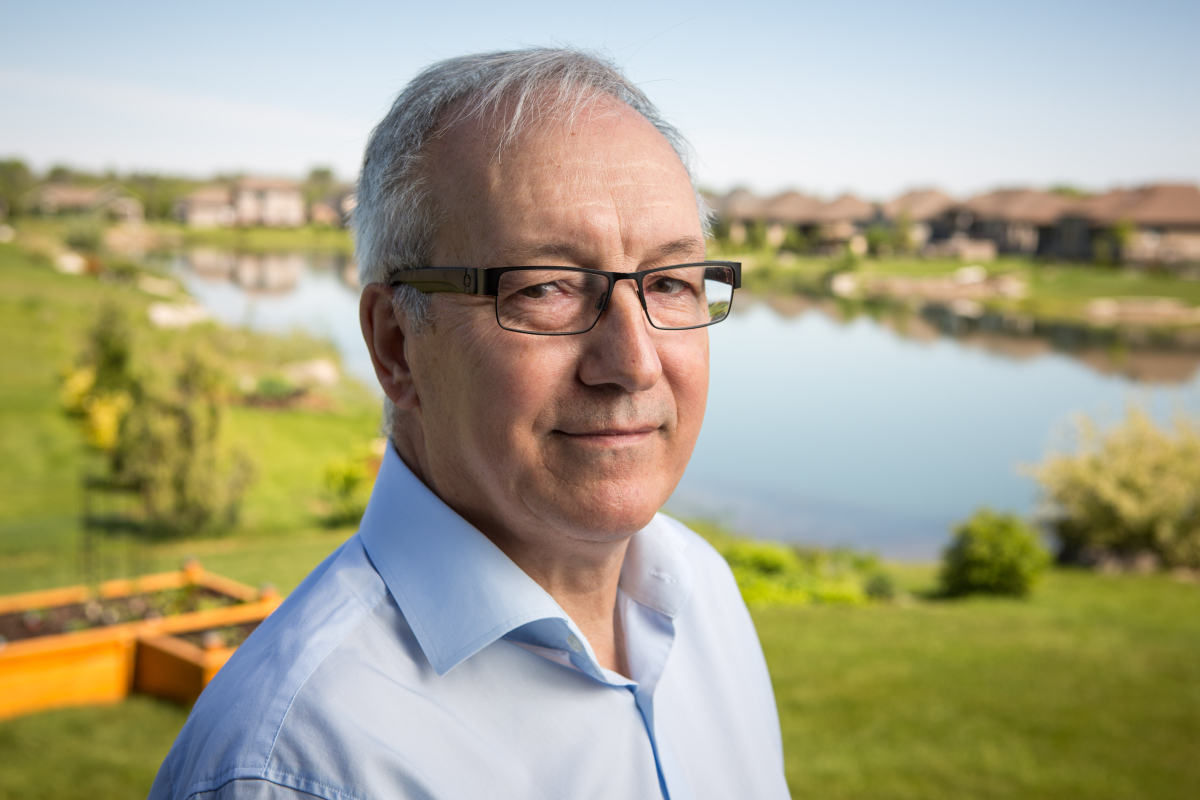
Touchette and Bédard, together again
Flash forward to 2016, with the two executives working together again at the energy regulator.
Bédard was the "project authority" on a new $24,150 contract with Ottawa-based Presidia Security Consulting to investigate whistleblowers within the NEB. Someone had told National Observer about a poorly-timed joke Touchette had made about whether staff needed tasers to defend themselves against environmentalists following a protest at a panel session for the Energy East pipeline project. Senior executives wanted to know who had leaked the story.
Internal emails show that Bédard initiated the discussions leading to the contract with Presidia, a private security firm, in the fall of 2016 after he asked questions to other NEB colleagues about the leak. The Presidia contract also indicated that the NEB's chief executive, Watson, would decide whether to proceed with a full-blown investigation.
Watson and other NEB officials had a Nov. 2, 2016 meeting with Bud Garrick, an investigator from Presidia who previously worked for the Canadian Forces National Investigative Service — the elite squad that had hunted for Pugliese's sources — as its commanding officer.
Soon after that, Bédard sent a message to all staff explaining that the full investigation was necessary, accusing whistleblowers of lacking integrity and professionalism. Such people were, in his words, a "security risk."
Presidia completed its investigation this year after searching NEB emails and BlackBerry accounts to see whether anyone at the NEB had been in contact with National Observer. Presidia also said in its report that it had interviewed some NEB staff as part of its investigation. The firm later submitted a report to the NEB, dated on March 7, that speculated about what happened but failed to identify any whistleblowers.
Despite this failure, Touchette told National Observer at an event in Montreal last June that she thought it was a "good idea" to issue the contract, while noting that this was Bédard's decision.
Bédard also drafted a message to all staff warning them that management would "investigate and take appropriate action" if other instances occurred in the future. He sent the draft message to Touchette, Watson and other senior NEB leaders for their approval on March 8.
"Throughout this process staff raised concerns and criticisms with their peers and supervisors," Bédard wrote in the email for all staff, released through access to information legislation. "Some resulted in lessons learned and improvements to activities and process. But all were discussed and delivered in a safe and respectful manner. I encourage all staff, in particular leaders, to continue to help facilitate this environment. And remind us all that this is the appropriate manner in which to share our concerns and criticisms."
Watson responded a few hours later, giving Bédard the green light to send his message.
"I have read the investigation report and understand that the investigation has been concluded," Watson wrote. "Sylvain, you should proceed with advising our staff that the investigation is now closed."

'I've already texted Sylvain (censored)'
Internal records show that Bédard was hired by the NEB following a competitive search by a Calgary-based headhunting firm called Odgers Berndtson. The firm identified several candidates for the job, including Bédard and a strong internal candidate within the NEB.
The candidates were interviewed by the private firm, but Bédard was the only one formally interviewed by senior executives at the NEB's Calgary office. The internal candidate didn't get that opportunity.
Bédard, who, according to his LinkedIn profile, was based in Ottawa where he worked for Bombardier, flew in to Calgary on June 26, 2016, for an interview the next day. Two days later, Touchette wrote to Jennifer Ward, a partner at the headhunting firm, confirming that her former colleague from National Defence would get an offer.
"Peter just saw his references and was extremely impressed. We are offering him the job," Touchette wrote in a partially censored June 29, 2016 email, released through access to information legislation. "I've already texted Sylvain (censored) but (censored) if you could actually reach him, that would be great."
When asked for a copy of the text message that Touchette sent Bédard on that day through access to information legislation, the NEB confirmed that she had "used her work cell phone and the message got deleted."
It is not entirely clear why the NEB executives chose not to interview its internal candidate for the job, but an email from Odgers Berndtson, also released through access to information legislation, indicated that its consultant thought Bédard was the stronger candidate. The internal human resources documents also indicate that a former cabinet minister was among his references, but the NEB censored that person's identity prior to releasing the documents through access to information legislation.
In a short phone interview, Ward, a partner at Odgers Berndtson who specializes in recruiting senior leaders in the industrial and energy sectors, declined to say how Bédard's name came on the radar for the transparency executive job.
"I can never comment on any search that we do. It's incredibly confidential. I can give you a blanket statement, which would be any search we conduct that we do is very thorough and rigorous, and if necessary, national or international. But I can't comment on any specifics," said Ward.
"There was a very thorough process. A number of people were interviewed."
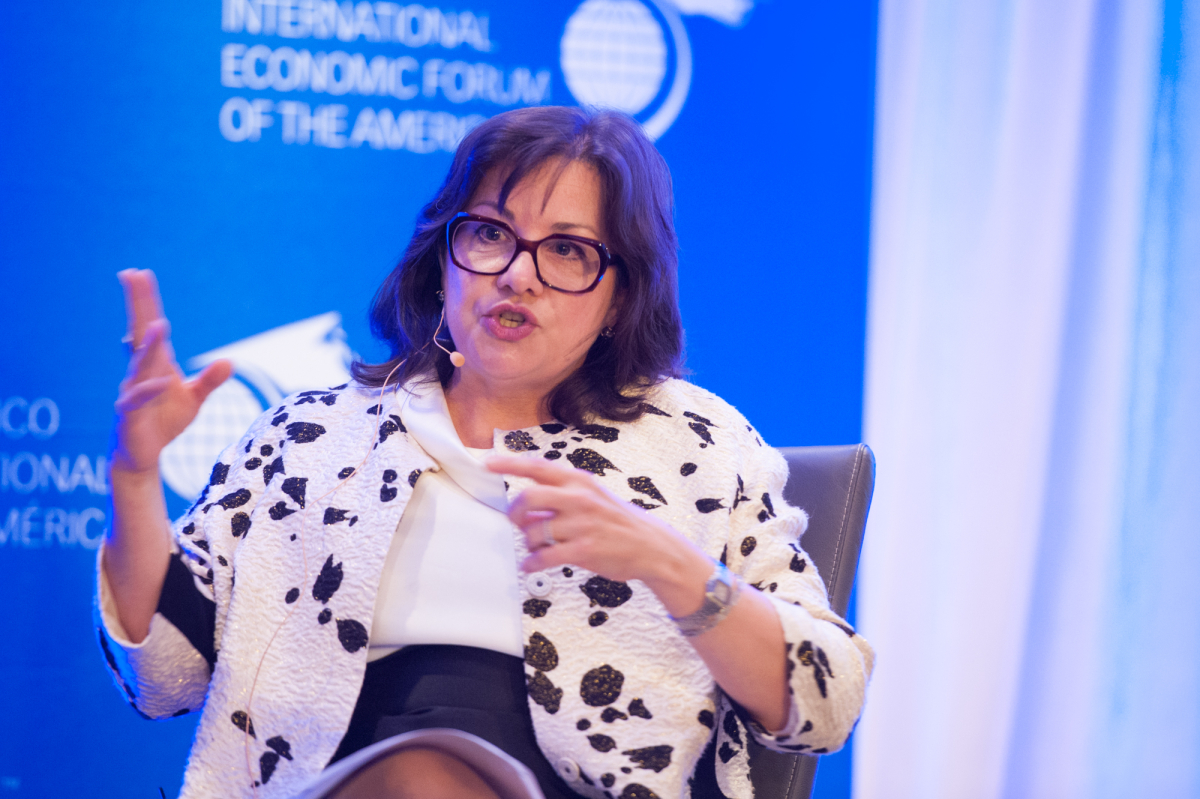
How is Bédard promoting transparency at the NEB?
Internal documents show that Bédard was hired in a position with a salary range between $142,800 and $178,300. The documents also show that members of the executive group of NEB staff are eligible to receive a lump-sum "performance award" worth up to 21.1 per cent of their salary, as well as a retention bonus.
When asked by National Observer for examples of what Bédard was doing to promote transparency, the NEB declined to respond.
But if you ask Cyr, his former colleague from the Department of National Defence, Bédard didn't have a track record of promoting transparency at DND.
"The term I would use is he was a fixer," Cyr said.
"He was a guy who made problems go away. That was his thing. (He was) a very charming, capable, competent fellow who was helpful. He thought, like a lot of people do, that trained monkeys can do public affairs business, effectively, and that’s not the case...
"But as he orbited around that office, I would say his thing was dealing with problems — on behalf of Madame Touchette he fixed things, (and) made things go away.”
Bédard and Touchette billed taxpayers more than $73,000, collectively, for their separate moves to Calgary from the Ottawa region. In the case of Bédard, the NEB recently said it has still not finished adding up the totals.
Since 2015, Touchette has also charged more than $21,000 for four separate trips to Paris, including two in April and May 2017 for OECD meetings as well as a stopover for federal government meetings in Ottawa. The NEB also confirmed that Touchette participated in a 2017 decision to transfer $200,000 for the federal Natural Resources Department to send to the OECD.
Touchette said that any travel related to the competition for the OECD job was done during her leave time and not reimbursed by the NEB. The other reimbursed travel was related to her role representing the NEB and Canada at various OECD events, including the Network of Economic Regulators.
But she also asked staff in an internal message sent on June 7, 2017 to "support" the NEB's new partnerships with organizations such as the International Energy Agency (IEA) and the OECD, explaining that they were global leaders in their respective areas. She declined to say whether she was aware of her job prospects at the OECD at the time she sent this message that would mention her future employer by name.
"These engagements are giving us the opportunity to learn from others' experiences, to share our expertise, and to explore opportunities to collaborate on common challenges," Touchette wrote in the message, reviewed by National Observer. "I know you are interested in this innovative approach to achieving regulatory excellence and as we continue to foster these relationships we will need the support of staff, at all levels of the NEB, to help deliver on these exciting international engagement activities."
She added that these relationships and collaborations would also allow the NEB to "further instill confidence and credibility with Canadians and better serve the public interest."
Despite these glowing endorsements, the partnerships were only briefly mentioned in a section of a recent NEB report to Parliament, but the regulator has not yet made any major public announcements of its new collaborations. When asked about the absence of a public announcement, the NEB confirmed that it is collaborating with Natural Resources Canada and the OECD to promote research on safety oversight culture, but said that it had "no formal partnership" with either the IEA or the OECD.
A few months after her appeal to staff, Touchette left the NEB to take on her new role as executive director of the OECD in Paris, with an annual salary that would start in the range of about $220,000 for someone in her position, according to a spokesman.
"She was considered to be an excellent candidate with the right experience and the person best suited for the post," said an OECD spokesman in an email, adding that Touchette was "thoroughly vetted" both by a panel composed of internal staff and an external advisor.
Touchette noted that she took steps to avoid conflicts of interest during the competition for the OECD job, explaining that she believed the need to avoid conflicts of interest was of particular importance to public servants. She said this specifically means avoiding influencing decisions from which someone might derive a private benefit.
"I have always been guided by this principle in my actions, including the situation about which you are inquiring," she told National Observer. "There was no potential private benefit to me when in November 2016 I made a recommendation to Peter Watson, CEO of the National Energy Board, that the NEB consider making a voluntary contribution to the OECD for work on safety culture in the pipeline industry."
She added that this advice came several months before the OECD launched a competitive process that led to her new job.
"Moreover, when I received a job offer from the OECD in the summer of 2017, it was before any Memorandum of Understanding for a Voluntary Contribution was in place," she said.
"The decision to enter into such a voluntary contribution did not rest with me but with the CEO, Peter Watson, and with officials at Natural Resources Canada. Furthermore, in the interest of transparency, and in accordance with the Treasury Board Policy on Conflict of Interest, to make sure decisions by the NEB were made for public benefit, I immediately disclosed to Mr. Watson, my supervisor and Deputy Head, that I was considering applying for an opening at the OECD, and I kept him informed of every step in the process. Based on the foregoing, it is clear there was no possibility of personal benefit."
Touchette also defended the note that she sent to staff, saying that while she didn't recall its specifics or the context in which it was written, that she believed it was "appropriate to encourage awareness" of the NEB's international activities among staff.
Meantime in Calgary, the NEB said in a statement to National Observer that it had no plans to review Touchette's actions or decisions, explaining that it "wasn't aware" of any inappropriate actions taken by staff in relation to the OECD.
It has also not begun a search to replace Touchette.
And six years after he had defended MacKay's helicopter ride, and only two years into his new job promoting transparency at the NEB, Bédard remains on his extended leave of absence.

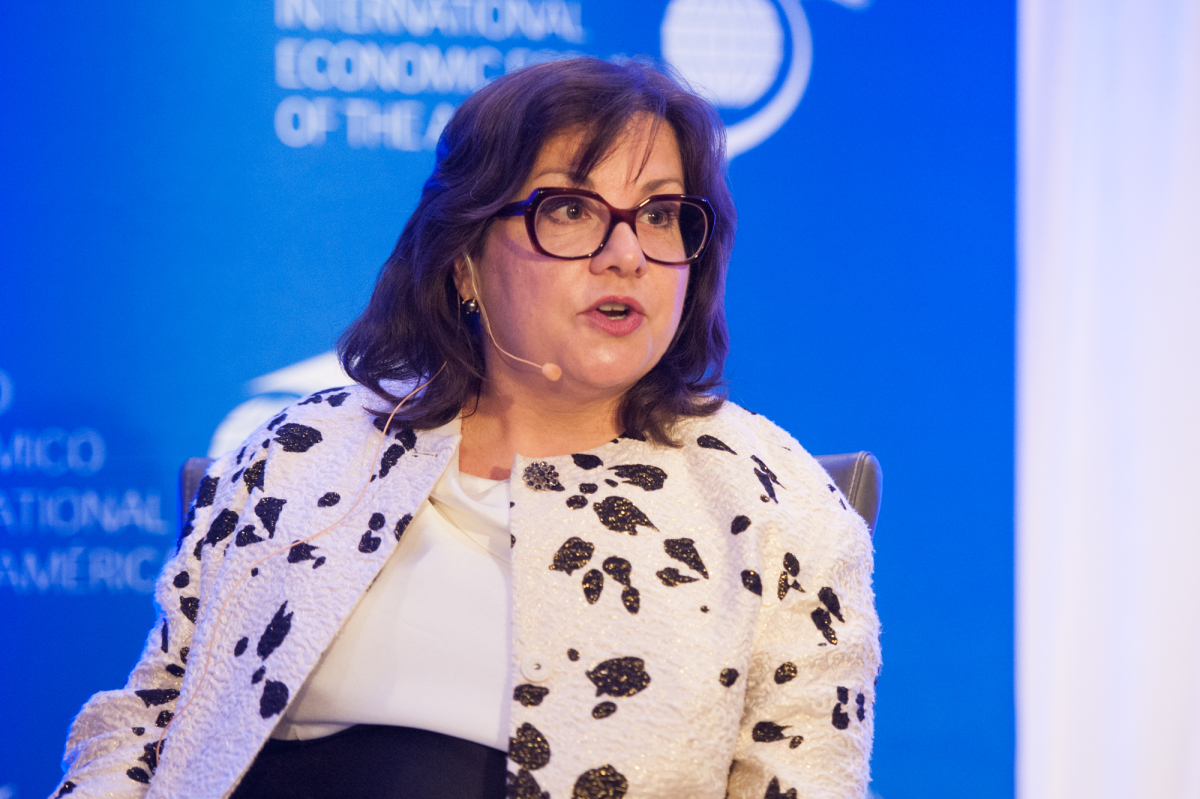



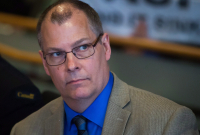
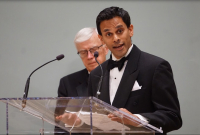
Comments
The good old shell game.
The rot really starts to smell at DND.
It gets so rank, it's conveniently moved to the NEB, where it became even more putrid, and everyone there knows about it, but can't talk about it for fear of being "investigated".
Then the stink gets divided - half sent overseas, half on unexplained leave.
Tomato juice can't even get rid of the smell.
Just burn and bury this putrifying mess, and start anew, with the "modernized" phoenix we've all been promised.
The institutional corruption has saturated and poisoned even the stone buildings of all levels of government in this country to such a depth it has rendered our "democratic system" a HAZMAT danger to all remaining life forms.
Having unqualified political hacks calling the shots in every department and replaced with every new government costs a fortune, creates chaotic ever-changing mandates, destroys morale of staff and ensures very little is ever accomplished. Until every department is insulated from meddling and all jobs are merit based, it's more of the same. Didn't the PM make some promises about ending appointees along with the "modernizing" the NEB and environmental commitments he made? Before he won and broke them all, I mean. Had the one about ending FPTP not been among them, it would be much easier for voters to send a message about that next election.
All the NEB really needs to do is institute password protocol's similar to those used at the National Observer, and their troubles will be over! Our tax dollars will continue to support Oil and Gas companies however they set up to protect themselves against transparency, and whoever they hire to increase said transparency.
Regardless of whether Liberals or Conservatives are in power, our governments are mostly captured by fossil fuel interests....and the thing is, thanks to the good work of organizations like the NEB, more and more Canadians know it.
I see nothing at all wrong with trying to plug leaks (in general); any competent, responsible agency should do that. Despite what people like to think, organizations all (public and private) need a reasonable degree of confidentiality to function. But private eyes? That seems extreme.
More importantly; hiring Bedard was almost certainly a done deal; the fix was in by Touchette, and I infer a clear intention to hire him whatever the consultants thought. AND: how thorough could the search be? If Odgers Berndtson had simply googled "Bedard" they would have caught the Helicopter Lie. Seems that would figure in any hiring decision, eh?
And a final point: moving costs ($71,000?) should be offered as a forgivable loan. I did that once, and it was a 24-month "loan". You quit or are fired after 12 months, say, and you repay 1/2 the moving costs. Seems Bedard wouldn't have made the 24 months: he should repay some, at least, of the moving costs.